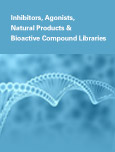Request The Product List ofBcr-Abl
Bcr-Abl
Bcr-Abl tyrosine kinase (Breakpoint cluster region Abelson) is a constitutively activated cytoplasmic tyrosine kinase (TK) and is the underlying cause of chronic myeloid leukemia (CML). To date, imatinib represents the frontline treatment for CML therapy. The development of resistance has prompted the search for novel Bcr-Abl inhibitors.
In Philadelphia chromosome-positive (Ph+) acute lymphoblastic leukemia (ALL), the BCR-ABL translocation is the main transforming event; consequently, it is targeted by ABL-tyrosine kinase inhibitors (TKIs), the first of which to be identified was imatinib mesylate. There are now four newer TKIs, three so-called second-generation inhibitors and one third generation inhibitor, all of which are more potent than imatinib in in vitro assays. Since 2001, the Bcr-Abl inhibitor imatinib represents the first-line therapy for CML and also the second-generation Bcr-Abl inhibitor nilotinib and the dual BcrAbl/Src inhibitor dasatinib are now successfully used. Ponatinib, AP24534, by Ariad Pharmaceuticals Inc. has been approved by FDA for the treatment of resistant or imatinib-intolerant CML and Ph+ ALL patients, especially those harboring the T315I mutation. On September 2012, bosutinib received the approval by FDA and in 2013 it was approved also by European Medical Agency.
The search for Bcr-Abl inhibitors is very active. Bcr-Abl inhibitors constitute a very appealing research field that can be expected to expand further.
References:
1. Soverini S, et al. Cancer. 2014 Apr 1;120(7):1002-9.
2. Thomas X, et al. Expert Opin Drug Discov. 2016 Nov;11(11):1061-1070.
3. Boer JM, et al. Eur J Cancer. 2017 Sep;82:203-218.
4. Shami PJ, et al. Leukemia. 2012 Feb;26(2):214-24.
5. Wylie AA,et al. Nature. 2017 Mar 30;543(7647):733-737.













